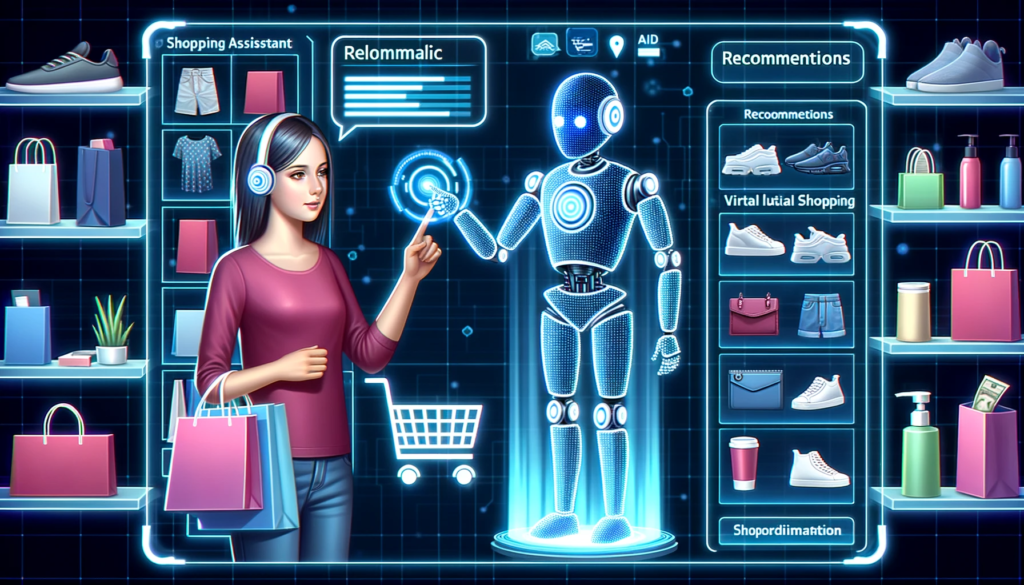How to Use AI for eCommerce

How can one use AI for eCommerce? Have you ever wondered how some ecommerce businesses seem to effortlessly stay ahead in the competitive online market? Well, the secret lies in utilizing Artificial Intelligence (AI) to optimize their operations.
In this article, we will explore the fascinating world of AI and how it can revolutionize the way you run your ecommerce business, ultimately leading to increased profits and success. By harnessing the power of AI, you can stay ahead of the curve, make smarter business decisions, and provide personalized experiences to your customers.
So, get ready to dive into the world of AI and discover how it can transform your ecommerce business into a thriving online venture.
1. Understanding AI
1.1 What is AI?
AI, or Artificial Intelligence, refers to the development of computer systems that can perform tasks that would typically require human intelligence. It involves the creation of algorithms and models that enable machines to learn from data, adapt to new information, and make decisions or predictions with minimal human intervention.
1.2 How does AI work?
AI systems are built upon the principles of machine learning, which involve training algorithms to recognize patterns and make predictions based on large amounts of data. This data is fed into the AI system, which then analyzes it and generates insights or outputs. AI algorithms can be programmed to learn from their experiences and improve their performance over time through a process called deep learning. This enables the AI system to continually refine its understanding and make more accurate predictions or decisions.
2. Role of AI for Ecommerce
2.1 Enhancing Customer Experience
One of the key ways AI can significantly impact ecommerce is by enhancing the overall customer experience. By analyzing customer data and preferences, AI algorithms can personalize the shopping experience, making it more relevant and enjoyable for each individual. AI-powered recommendation systems can suggest products based on past purchases or browsing behavior, increasing the likelihood of a successful sale and fostering customer loyalty.
2.2 Personalized Recommendations
AI algorithms play a crucial role in providing personalized product recommendations to customers. By analyzing historical data on customers’ preferences, purchase history, and browsing behavior, AI algorithms can suggest relevant products that match their interests. These personalized recommendations not only improve the shopping experience for customers but also increase the likelihood of making a sale, thus boosting revenue for ecommerce businesses.
2.3 Chatbots for Customer Support
AI-powered chatbots have become increasingly popular in ecommerce for providing efficient and personalized customer support. These chatbots can handle common customer inquiries, such as order tracking, product inquiries, and returns, without the need for human intervention. With natural language processing capabilities, chatbots can understand customer queries and provide accurate responses in real-time. This not only saves time for both customers and businesses but also ensures a consistent and fast customer service experience.
2.4 Automated Inventory Management
AI can streamline inventory management for ecommerce businesses by automating processes such as demand forecasting, inventory replenishment, and stock rotation. By analyzing historical sales data, market trends, and other relevant factors, AI algorithms can accurately predict future demand, ensuring that the right amount of stock is always available. This not only prevents stockouts and overstocking but also reduces costs and improves operational efficiency.
3. AI-Powered Customer Segmentation
3.1 Importance of Customer Segmentation
Customer segmentation is crucial for effectively targeting and engaging different customer groups. By dividing customers into distinct segments based on their characteristics, preferences, and behaviors, ecommerce businesses can tailor their marketing strategies and offerings to each segment’s specific needs. AI-powered customer segmentation takes this process to a whole new level by analyzing vast amounts of customer data, identifying hidden patterns, and creating highly targeted segments that maximize marketing effectiveness and customer satisfaction.
3.2 AI-Based Customer Segmentation Techniques
AI-based customer segmentation techniques leverage machine learning algorithms to automatically analyze a wide range of customer data, such as demographic information, purchase history, browsing behavior, and social media interactions. These algorithms can identify patterns and similarities across customers to cluster them into meaningful segments. By considering multiple variables simultaneously, AI algorithms can create more accurate and granular segments, enabling ecommerce businesses to personalize their marketing strategies and tailor their offerings to each segment’s preferences.
4. AI-Driven Pricing Strategies
4.1 Dynamic Pricing
Dynamic pricing is an AI-driven strategy that allows ecommerce businesses to adjust their prices in real-time based on various factors such as supply and demand, competitor pricing, and customer behavior. By continuously analyzing these factors, AI algorithms can automatically update prices to optimize revenue and profitability. Dynamic pricing strategies can help businesses stay competitive, maximize revenue during peak demand periods, and increase customer satisfaction by offering fair and competitive prices.
4.2 Price Optimization
AI algorithms can also optimize pricing strategies by analyzing historical sales data, market trends, and customer behavior. By identifying price thresholds and price elasticity, AI algorithms can determine the optimal price points for different products and customer segments. This enables ecommerce businesses to maximize revenue and profitability while remaining competitive in the market. Price optimization can also help businesses identify opportunities for discounting or bundling products to increase sales and attract customers.

5. AI-Powered Fraud Detection
5.1 Identifying Suspicious Patterns
AI-powered fraud detection systems analyze vast amounts of transaction data to identify suspicious patterns and detect fraudulent activities. By leveraging machine learning algorithms, these systems can identify anomalies and deviations from normal patterns, enabling businesses to take immediate action to prevent fraud. AI algorithms can continuously learn from new data, adapting to evolving fraud patterns and improving their accuracy over time.
5.2 Real-time Monitoring
AI-powered fraud detection systems can monitor transactions in real-time and flag potential fraudulent activities as they occur. This allows businesses to mitigate risks and take immediate action to protect themselves and their customers. Real-time monitoring helps detect fraud before it results in financial losses, ensuring the overall security and trustworthiness of ecommerce platforms.
6. AI in Supply Chain Management
6.1 Demand Forecasting
AI algorithms can significantly improve demand forecasting accuracy by analyzing historical sales data, market trends, and other relevant variables. By identifying patterns and correlations, AI models can accurately predict future demand, allowing ecommerce businesses to optimize their inventory levels, production schedules, and supply chain operations. Accurate demand forecasting helps prevent stockouts, minimize excess inventory, and improve overall supply chain efficiency.
6.2 Supplier Selection
AI technologies can assist in selecting and evaluating suppliers by analyzing multiple factors such as price, quality, reliability, and customer feedback. AI algorithms can automatically compare and rank suppliers based on predefined criteria, enabling businesses to make informed decisions when choosing suppliers. AI-powered supplier selection can reduce the time and effort required for manual evaluation, ensuring that ecommerce businesses can partner with reliable suppliers that meet their specific requirements.

7. AI-Enabled Inventory Management
7.1 Automated Reordering
AI-powered inventory management systems can automate the process of inventory reordering. By analyzing historical sales data, current inventory levels, and other relevant factors, these systems can calculate optimal reorder points and quantities. Automation of inventory reordering ensures that ecommerce businesses can maintain optimal stock levels, preventing stockouts and reducing excess inventory carrying costs.
7.2 Stock Rotation Optimization
AI algorithms can optimize stock rotation by considering factors such as product shelf life, expiration dates, and customer preferences. By analyzing these factors, AI-powered inventory management systems can determine the optimal order fulfillment strategy, ensuring that older or perishable stock is sold first. Stock rotation optimization helps minimize waste, reduce losses due to expired or unsold inventory, and improve overall inventory turnover.
8. AI-Enhanced Marketing Strategies
8.1 Targeted Ads and Campaigns
AI algorithms can analyze vast amounts of customer data to identify patterns, preferences, and behaviors that enable the creation of highly targeted and personalized advertisements and marketing campaigns. By understanding individual customer characteristics and preferences, AI-powered marketing systems can deliver relevant and compelling advertising content that maximizes engagement and drives conversions. Targeted ads and campaigns help businesses optimize their advertising budget, increase ROI, and create a more personalized and engaging customer experience.
8.2 Social Media Influencer Analysis
AI technologies can analyze social media data to identify key influencers who can help amplify and promote ecommerce businesses. By analyzing factors such as follower count, engagement rates, and audience demographics, AI algorithms can identify influencers who align with the brand’s values and target audience. This enables businesses to collaborate with influencers to reach a wider audience, increase brand awareness, and drive customer engagement.

9. AI for Logistics and Delivery
9.1 Route Optimization
AI-powered logistics systems can optimize route planning and scheduling for efficient and cost-effective delivery operations. By analyzing factors such as delivery locations, traffic conditions, and delivery time windows, AI algorithms can determine the most optimal delivery routes and schedules.
Route optimization helps reduce delivery costs, improve delivery speed, and enhance overall customer satisfaction.
9.2 Last-Mile Delivery
Last-mile delivery, the final leg of the delivery process, can be optimized using AI-based technologies. AI algorithms can analyze historical delivery data, customer preferences, and real-time traffic conditions to optimize the last-mile delivery process.
By identifying the most efficient delivery routes and scheduling deliveries based on customer preferences, AI-powered last-mile delivery systems can ensure timely and convenient deliveries, reducing delivery costs and enhancing the customer experience.
10. Overcoming Challenges of AI Implementation
10.1 Data Privacy and Security
AI implementation in ecommerce requires access to vast amounts of customer data. Ensuring data privacy and security is of paramount importance to maintain customer trust. Ecommerce businesses must implement robust security measures, such as encryption, access controls, and secure data storage, to protect customer data from unauthorized access or breaches.
Additionally, businesses should comply with data privacy regulations and obtain explicit consent from customers for data collection and usage.
10.2 Skill Gap and Training
Implementing and utilizing AI technologies in ecommerce requires a skilled workforce with expertise in AI and data analytics. However, there is often a skill gap in the industry, making it challenging for businesses to find skilled professionals.
To overcome this challenge, businesses can invest in training programs to upskill existing employees or partner with external experts and consultants to leverage their AI expertise. Continuous training and development are essential to ensure that employees have the necessary skills and knowledge to maximize the benefits of AI in ecommerce.
Wrap Up
AI has become an integral part of the ecommerce industry, revolutionizing various aspects of online businesses. By leveraging AI technologies, ecommerce businesses can enhance customer experience, optimize pricing strategies, detect fraud, improve supply chain management, streamline inventory operations, and optimize marketing strategies.
However, it is crucial for businesses to overcome challenges such as data privacy and security concerns and skill gaps to successfully implement and utilize AI in ecommerce. With proper implementation and utilization, AI can empower ecommerce businesses to thrive in the competitive online marketplace and maximize their revenue potential.
FAQ
What is AI for eCommerce?
AI for eCommerce refers to the use of artificial intelligence technologies in the online retail sector. This application of AI can encompass a range of capabilities including customer data analysis, personalized product recommendations, logistics optimization, and automated customer service interactions through chatbots.
How does AI benefit eCommerce businesses?
AI can greatly benefit eCommerce businesses in multiple ways. These include predicting customer behavior for personalized shopping experiences, optimizing supply chain and inventory management, improving customer service through automated responses, and enhancing site search functionality. Overall, AI can lead to increased sales and better customer retention.
What are some examples of AI in use in eCommerce?
Examples of AI use in eCommerce include chatbots and virtual assistants that help customers with their queries, recommendation engines that offer personalized product suggestions based on past purchases or browsing history, and AI algorithms that streamline operations such as logistics, pricing, inventory management, and fraud detection.
Is AI expensive for eCommerce businesses to implement?
The cost of implementing AI in eCommerce varies greatly depending on the scale and scope of the desired application. Smaller businesses may start with a basic chatbot or product recommendation feature, which can be relatively affordable. However, more sophisticated AI technologies involving comprehensive data analysis and automation can cost substantially more. The return on investment can often justify these initial costs.
How does AI improve customer service in eCommerce?
AI improves customer service in eCommerce primarily through the use of chatbots and virtual assistants. These tools can provide instant responses to common customer queries, offer personalized recommendations and can even handle complaints or return requests. This leads to faster, more efficient customer service, which can greatly improve customer satisfaction.
Can AI in eCommerce help improve sales?
Yes, AI can significantly boost sales in eCommerce. Through personalized recommendations, businesses can upsell and cross-sell products, leading to increased purchases. Furthermore, predictive analysis can help offer special deals and discounts to customers who are more likely to make a purchase, further driving sales.
What is the role of AI in eCommerce personalization?
AI plays a crucial role in eCommerce personalization. AI algorithms analyze customer browsing and purchase history to personalize their experience, whether through recommended products, personalized emails, or targeted advertising. This personalization helps to increase customer engagement, improve customer loyalty, and ultimately drive increased sales.
Does AI require a large amount of data for eCommerce applications?
AI generally performs better with a large amount of data, as it uses this data to learn and make predictions. In eCommerce, data can include customer purchase history, browsing habits, and personal details. However, with the right AI tools and algorithms, even smaller datasets can be used effectively.
How does AI contribute to efficient inventory management in eCommerce?
AI can analyze historical sales data, predict future demand and sales trends, and determine optimal inventory levels. This helps eCommerce businesses avoid stockouts and overstocks, reducing costs and improving customer satisfaction. AI can even predict future trends and suggest when to buy more of a specific item, helping businesses plan for seasonal fluctuations.
How does AI help in pricing strategy in eCommerce?
Through AI, eCommerce businesses can implement dynamic pricing strategies where prices are updated in real-time based on factors like demand, competitor prices, and customer behavior. AI algorithms are capable of analyzing large amounts of data quickly, enabling businesses to react more swiftly to market changes and optimize their pricing.
